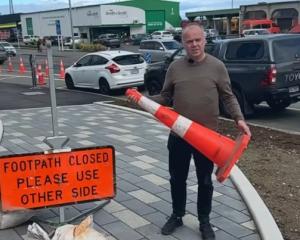
I was immediately reminded of those Tui beer posters that end in “Yeah Right!”
The politicians did not disappoint.
We heard debates about golf courses, gravel, and a place called Amberley Beach. We watched MPs wander off into tangents on tax or play down climate risks that international scientists take deadly seriously.
The audience of business leaders, scientists, and innovators who deal with the hard realities of climate change every day, could only respond with incredulous laughter.
Former Climate Change Commission chair Rod Carr summed it up perfectly, suggesting it felt like a game of peek-a-boo being played by two-year-olds posing as politicians. If you cover your eyes or, in the case of one, just roll them, then the problems disappear.
That image is funny until you remember what’s at stake.
While our elected representatives play peek-a-boo, climate change is wrecking livelihoods, damaging infrastructure, and shutting us out of the very markets our economy depends on.
While they bicker about gravel, or the inconvenience of losing a few holes on a golf course, New Zealanders are out here building solutions.
Imagine if, instead of finger-pointing and blame, there was a political force committed to real, evidence-based, Kiwi-led solutions. Not ideology. Not outrage. Just practical, sector-by-sector strategies that deliver both climate action and economic growth.
A political party that accepted that, to make a difference, you had to be seated at the table, with solutions that voters could understand.
A vision for leadership that we could all buy into. A vision that recognised the opportunities that came with climate change that could make Aotearoa a world leader once again.
And the playbook is already being written by innovators right here at home.
Forestry: The Bioeconomy is Here
For decades forestry has been reduced to shipping raw logs offshore for between NZ$100-$130 dollars per ton, leaving others to make the real money. But companies like NZ Bio Forestry, founded by Wayne Mulligan, are showing us another way.
Wayne is just one of a number of kiwi-based innovators that are re-engineering trees from wood products to biochemicals and biofuels. Plant-based alternatives that can replace petroleum products in plastics, medicines, perfumes, electronics and fuels.
It’s a market that has a potential to add between $12- $30 billion per year to our GDP.
Through a partnership with Taiwanese firms PanCycle and Inspira Applied Bio Solutions, NZ Bioforestry recently announced an initial contract for 25,000 tons of PLA, a fossil free plastic alternative made from our trees that sells for NZ$5,000 per ton.

“Next time you look at a forest,” Mulligan says, “see it as a huge biomass of molecular technologies that come from New Zealand that replace fossils and petroleum.”
This isn’t just an environmental win. It’s an economic one: high-value regional jobs, revitalised rural communities, and a new export sector that positions New Zealand at the forefront of the global bioeconomy.
Energy: The Supercritical Leap
In a recent announcement Bill Gates stated that the future of energy was geothermal. It was why he is investing billions of dollars in it. New Zealand has been a global leader in geothermal for decades, and now we have the chance to lead again with supercritical geothermal.
This is an energy source that could provide uninterrupted, unlimited, weather-independent, fossil free electricity that would put New Zealand once more at the leading edge of the geothermal opportunity. And here I must give credit where credit is due.
The government’s recent $10.69 million investment in the “DeepHeat” programme is an example of public funding at its best. Seeding science that can become world-changing.
The project, led by Earth Sciences New Zealand alongside universities and international partners, is probing the Taupō Volcanic Zone’s superhot reservoirs. Early estimates suggest the potential for 30,000 GWh. That’s two-thirds of New Zealand’s total electricity needs. Stable, renewable and available 24/7!
Electrification: Rewiring Aotearoa
As we did in geothermal energy, New Zealand also once led the world in electrification.
We built the world’s first fully electric house, powered by renewable hydropower. Reefton, on the West Coast, was the second town in the world with electric street lighting, just weeks after Paris became the first. We also built the first transmission line in the Southern Hemisphere.
But today, more than 70% of our energy supply comes from imported fossil fuels, costing New Zealand consumers $55 million a day. Most of which goes off-shore.
It doesn’t have to be this way. Mike Casey, and Rewiring Aotearoa, have put together a powerful case for the electrification of Aotearoa.
It began with the world’s first fully electric cherry orchard which runs on 21 electric machines powered by solar energy. It’s cheaper. It’s cleaner. And its proof that the transition from fossil fuels to electric isn’t theoretical. It works, now!
His research team has shown how solar energy, scaled nationally on our houses, businesses and farms, would significantly lower the energy costs of the country, whilst at the same time saving billions in overseas spending on fossil fuels.
Combined with the potential from supercritical geothermal New Zealand could, once again, be a world leader. Embracing the opportunities around climate change and sustainability.
All we needs is political vision and courage.
The Prize: Prosperity Beyond Politics
These examples are not dreams. They are happening now, led by Kiwi innovators who see opportunity where politicians only see obstacles.
· Forestry could stop being a low-margin export of raw logs and become a source of world-leading, high value, bio-products
· Geothermal could leap to the supercritical frontier creating unlimited fossil free electricity, creating energy security here, and opening opportunities to explore international demand for supercomputer facilities.
· Electrification could cut our fossil fuel imports, reduce power bills, and give us one of the cheapest, cleanest energy systems in the world.
These are the opportunities we should be “Fast Tracking”.
They are the foundation for industries that will fast track us to the future, rather than the past.
This is not about “growing the economy.” It is about “transforming” it.
Building an economy that is resilient, sustainable, and prosperous for every New Zealander.
A Call to Leadership
It’s not that we lack solutions, but politicians should not be the toddlers in the room.
They should be the adults, uniting around a shared national vision that transcends party lines.
Instead of squabbling about gravel or golf courses, they should be listening to the innovators already building the future, working with them to scale those solutions, fast.
We don’t need more slogans. We don’t need more blame. We need a cross-party commitment to seize the opportunities that are in front of us.
Peek-a-boo!
- Sir Ian Taylor is founder and managing director of Animation Research Ltd.










